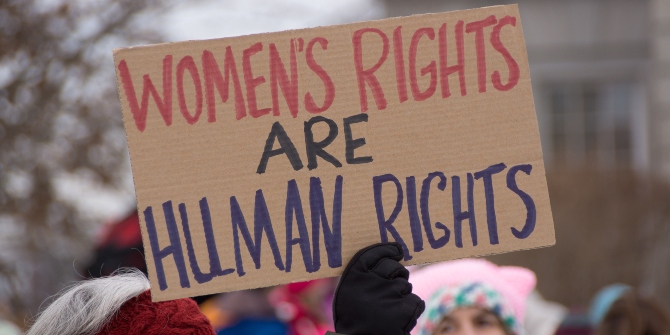A survey in five countries — the UK, Australia, Brazil, Canada, and the US — found that most workers from marginalised racial and ethnic groups are always on guard for bias and discrimination within their work teams. Rikia Birindelli-Fayne writes that the situation negatively affects health, wellbeing, and the ability to thrive at work.
Recent research finds that being on guard to bias or discrimination within your work team is the norm for most employees from marginalised racial and ethnic groups.
Being on high alert for racist remarks or insults, changing your appearance to ‘fit in’, or avoiding work occasions, like evening drinks, is exhausting and debilitating for employees from marginalised racial and ethnic groups. The additional burden of this ‘emotional tax’ negatively affects health, wellbeing, and the ability to thrive at work.
We surveyed workers in five countries, including the United Kingdom (60%), Australia (71%), Brazil (69%), Canada (51%) and the United States (53%). Although there are differences across the countries, the central tenet is that the majority (61%) of workers from marginalised racial and ethnic groups are always on guard for bias and discrimination within their work team.
We do not see a difference between the genders, as women (56%) and men (54%) are on guard at similar rates, but marginalised racial and ethnic groups who are LGBTQ+ (74%) and transgender and nonbinary employees (85%) show significantly higher rates of being on guard against bias.
According to our data, organisations not addressing this issue—by creating inclusive work cultures—are paying a high price. When employees from marginalised racial and ethnic groups are less on guard, they are three times more likely to:
- stay in their organisation;
- be engaged or emotionally invested in their work and their company’s mission;
- experience team cohesion, i.e., connection among team members as they work towards a common goal;
- and to report effective team problem-solving.
They are also four times more likely to experience inclusion, meaning they feel a valued, trusted employee and feel psychologically safe, enabling them to bring their full and authentic selves to work.
To make marginalised racial and ethnic groups feel less on guard, the study identified two important factors: psychological safety and how diverse the team is, i.e., the more racially and ethnically diverse a team is, as well as psychologically safe, the less likely the team members will feel on guard. We define psychological safety as the degree by which team members are allowed to make mistakes, feel supported and can tackle tough workplace issues without negative repercussions.
Feeling psychologically safe is not straightforward for workers from marginalised racial and ethnic groups as many complex factors are at play. For instance, research finds that they experience a smaller margin of error in their day-to-day work, so feel that they must be ‘perfect’ at their job. This pressure is compounded by the feeling that any mistakes made could be wrongly ascribed to their racial and ethnic background.
Organisations must also be mindful of ‘tokenism’, when they expect one employee to represent their racial and ethnic group. This can lead to the individual feeling a high level of stress, isolation and a feeling of being under pressure to speak up and represent their ethnic group.
To ensure that people from different cultural, ethnic and racial backgrounds and other intersectional identities are seen and heard, accountability is crucial and diversity, equity, and inclusion (DEI) goals should be linked to compensation or incentives. Leaders must also be seen to ‘walk the talk’, listening, learning, and reflecting on what they have heard; and communicating authentically.
Let’s not forget, it is the responsibility of everyone to stop exclusionary behaviour. Team members should be curious and listen to each other’s experiences as well as being able to safely speak up to challenge bias and discrimination that they witness. It is not acceptable to ignore behaviour that diminishes others and reinforces a hierarchy not based on merit.
It is an uncomfortable fact for many organisations that racism exists in the workplace, but the time has come for all organisations to take intentional actions to root out systemic bias, which is holding back workers from marginalised racial and ethnic groups. For as long as employees pay an emotional tax in the workplace, businesses and workers will suffer.
♣♣♣
Notes:
- This blog post represents the views of its author(s), not the position of LSE Business Review or the London School of Economics.
- Featured image by Desola Lanre-Ologun on Unsplash
- When you leave a comment, you’re agreeing to our Comment Policy.





